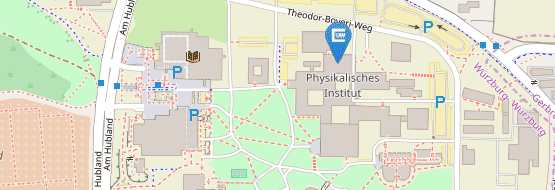i-RTG Lectures
"Electronic Band Structure and Topology of Buckled 2D Xenes"
| Datum: | 08.11.2024, 10:00 - 12:00 Uhr |
| Kategorie: | Kolloquium |
| Ort: | Hubland Süd, Geb. P1 (Physik), Röntgen-HS |
| Veranstalter: | SFB 1170 ToCoTronics |
| Vortragende: | Harold Zandvliet -U Twente/NL |
In this lecture I will give a brief introduction on the electronic band structure and topology of silicene and germanene (hereafter referred to as buckled 2D Xenes). The buckled 2D Xenes share many properties with their carbon counterpart graphene. 2D Xenes and graphene both host Dirac fermions, but there are also a few salient differences: (1) the spin-orbit coupling in 2D Xenes is much larger than in graphene and (2) the honeycomb lattice of the 2D Xenes is not flat, but buckled. The large spin-orbit gap in the 2D Xenes make theses materials the ideal candidate to test the Kane-Mele model [1]. The buckling of the lattice of the honeycomb allows to tailor the quantum state of matter of the 2D Xenes. By applying a perpendicular electric field the spin-orbit gap first closes and then reopens again. The reopening of the gap is accompanied by a topological phase transition of the buckled 2D Xenes from a two-dimensional topological insulator to a trivial band insulator [2]. This electric field-induced tailoring of the quantum state of matter allows to controllably switch the topologically protected helical edge states on and off. The latter makes these materials perfectly suited for the realization of a topological field-effect transistor [3].
References
[1]. C. L. Kane and E. J. Mele, Quantum spin Hall effect in graphene, Phys. Rev. Lett. 95, 226801 (2005).
[2]. P. Bampoulis et al., Quantum Spin Hall States and Topological Phase Transition in Germanene, Phys. Rev. Lett. 130, 196401 (2023).
[3]. B. Weber et al., 2024 Roadmap 2D Topological Insulators, J. Phys. Mater. 7, 022501 (2024).


